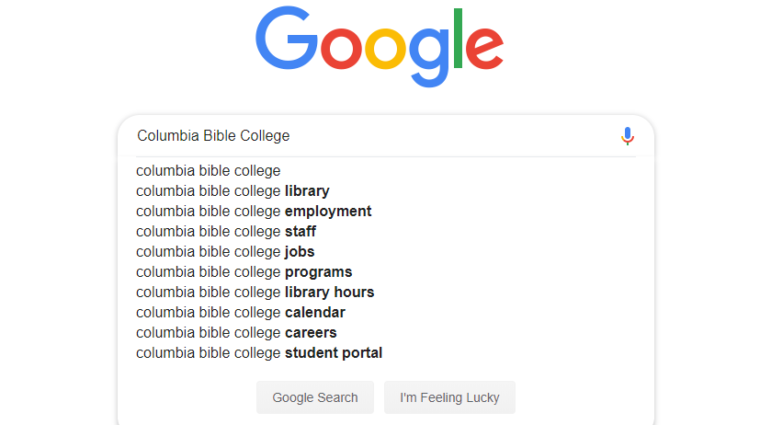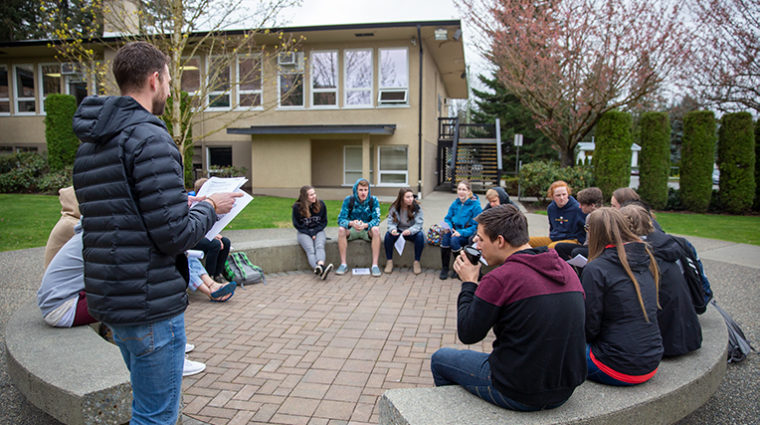Why “Intro to Self-Management” is a Course at Columbia
—

Let’s pretend you’re finishing high school, ready to move on with life, get a job, maybe travel a bit… but Grandma (or Uncle Joe or your friend Harvina) keeps talking to you about doing a year of Bible College. Not really where you’re leaning, but you do a bit of Googling just to humor her.
—
What do you find? Courses like Old Testament Survey: yup. Introduction to Theology… no surprise. Self-Management…
—
Wait – what?! Intro to Self-Management? What’s that all about? And what’s it doing at a Bible College anyway?
—
It’s true. If you attend Columbia Bible College, you may end up taking Self-Management for credit. It’s a required course for Quest and for Applied Leadership students, and an elective that’s open to everyone else.
—

—
At its core, Self-Management is about stewardship. Which is a big word that means how well you use and manage all the resources and gifts you’ve been given. Things like your time, your energy, your money, your stuff, your talents, your relationships. Add up all these big and small choices we make every day, and over time we develop what’s called our character.
—
If you’re familiar with your Bible, you can probably think of a few places in Scripture where this idea of ‘stewardship,’ or ‘self-management’ is key.
—
A few examples:
- Jesus told a story about wise (and foolish) employees that were rewarded (and punished) according to how they managed what they were given (Matthew 25:14-30). He emphasized that at the end of our lives we will have to answer for how we handle all we have been given.
- In the beginning, God made humans to be the live-in managers, responsible for the health of Earth (Genesis 2:15).
- Paul repeatedly lists self-control as a virtue we should be growing in.
—

—
Self-management isn’t just something Jesus and Paul cared about, though. Your boss (and your future bosses) care about it too. Employers are just as concerned about the character and self-management ability of their employees as they are their other skills. Teaching someone to use a a tool or software is way easier than teaching them to be diligent or dependable. And your potential spouse will hopefully care at least as much (if not more) about your character as they do about your salary – no amount of money can replace being respectful or make up for a lack of honesty.
—
So if you enroll in this Self-Management course, what can you expect?
—
Really, this course is a collection of bits and pieces of wisdom we have learned over the years. It’s taking what we know of God and people and how he designed things to work best, and then helping you apply that knowledge to yourself.
—
You’ll do assignments that help you get to know yourself better – your strengths, personality, and values, so you can live more intentionally. You’ll do a habit-formation assignment that gives you tools to build healthy habits into your life. You’ll even tackle a personal finance assignment.
—

It’s about becoming a better friend, a better employee or employer, a better spouse, a better parent, and a better follower of Jesus.
—
We are convinced that God cares intensely about how you steward not only the finances you have been given, but also your strengths, gifts, and time. It matters how you handle the things that stress you out and how you form and break habits. There is significance in how you make plans and goals, and how you respond when things don’t go the way you want them to. It matters to God, and it affects everyone in your life.
—
It’s about becoming a better friend, a better employee or employer, a better spouse, a better parent, and a better follower of Jesus. Not in the sense that God will love you more, but in the sense that you will be able to make more of the decisions you want to and actually be able to follow through on them! Good intentions are nice, but they are a far cry from a life lived in God’s power and according to his design – and that’s what ‘Self-Management’ is all about. Maybe we’ll see in you in class this Fall.
—


Matt Kliever is the Quest Program Associate. Matt grew up as a prairie farm-boy, but spending a year in the Adirondacks of New York allowed him to experience first-hand the discipleship opportunities made possible by mountains. Since then, he and his wife Koty have moved to Abbotsford to raise a family (two kids so far!) and to help facilitate adventure-filled years of discipleship for others. One of his biggest passions in life is helping people shape their identity as a follower of Christ so they can live lives of freedom and fulfillment.

